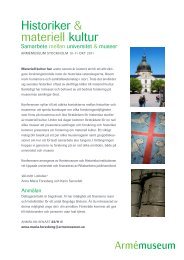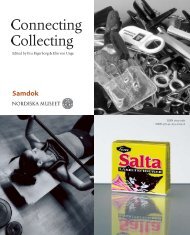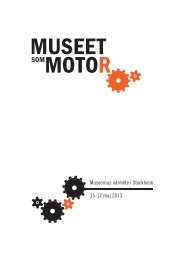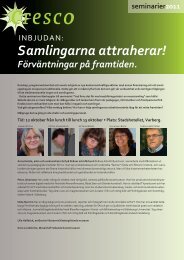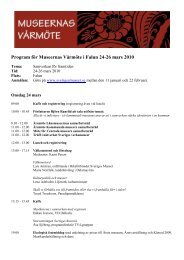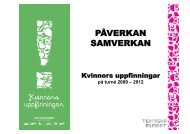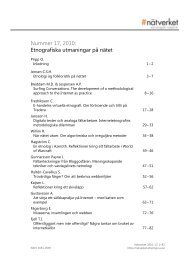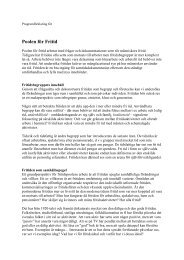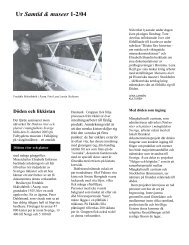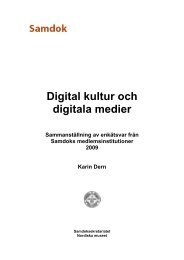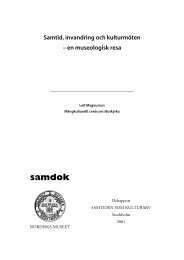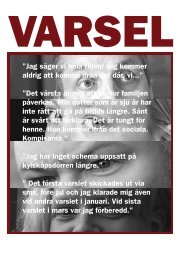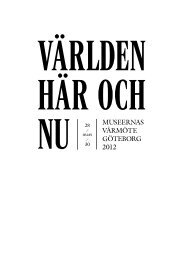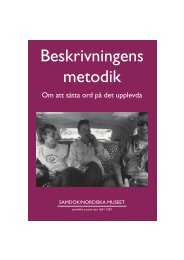Connecting Collecting - Sveriges Museer
Connecting Collecting - Sveriges Museer
Connecting Collecting - Sveriges Museer
You also want an ePaper? Increase the reach of your titles
YUMPU automatically turns print PDFs into web optimized ePapers that Google loves.
The Pool for Society and PoliticsPublic institutions in changeBy Eva Thunér Ohlsson and Kristina Stolt»Originally this was called thePublic Pool, and from the beginningour task was to study institutionsexercising public authority. Today oursphere is much wider, encompassingthe political and public sides of people’slives. The studies comprise phenomenain society that are reflected in the actionsof the state, regions, and municipalities,but we also take an interest in groupsand individuals who seek to affect publiclife.Decisions in parliament, countycouncils, and local councils create regulationsfor the life and actions of citizens,but market forces, opinion moulders,trendsetters, and non-profit groups arealso important actors. How this happens,with what methods, and what the consequencesare for the citizens is the focusof the pool’s interest. In these contextsthe citizens have many different roles –voters, elected representatives, professionals,the unemployed, early retirementpensioners, club members, schoolpupils, company leaders, employees, taxpayers,etc. – which must also be madeclear in our work.Some of the current social issues thathave been discussed in recent years andconsidered in the museums’ studies arethe restructuring of the public sector,the changed role and organization of thenational defence, integration policies,Sweden’s membership of the EU, and themulti-religious Sweden.Museums big and smallThe pool at present has eighteen members,most of which come from majorinstitutions with national or countyresponsibility, but some museums arereally small, with only one or two employees.The medical history group, which isone of the small museums, always has aHealth care, school, defence, police, and public administrationare some of the areas that interest the Pool for Society andPolitics. It is concerned with the significance of the institutionsfor society as a whole and for the individual, and with our wayof looking at society and each other.meeting of its own in connection withthe pool meeting. Here they ventilatetheir specific issues, which are oftenrelated to the fact that these museumsmostly were established on private initiativeand the collections are often ownedby associations run with grants from acounty council or a municipality. Themedical history group has been decimatedsince museums have been putin mothballs – a clear example showingthat changes in society and politicalpriorities are a part of everyday realityfor the pool members.MeetingsThe pool meets twice a year. Apart fromthe formal meeting we always have alecturer on a topic of current concern tothe pool. Practical questions of copyrightand ethical issues about the publicationof collected material, for example, fromminors, have been discussed. These areproblems that we all have in common.Reports about ongoing and plannedprojects in the museums are e-mailedto the members before the meeting andthen appended to the minutes for thearchive. We gain time in that the participantscan read the texts before themeeting and can bring up questions andthoughts about the projects.Working methodsThe pool also aims to develop the members’professional role. To do so, thisspring we conducted a field study inmini-format for half a day in the newentrance to the Södra Älvsborg Hospitalin Borås. We did both participantobservation and short interviews tosee how visitors acted and to hear whatthey thought of the entrance. Had theintentions of the hospital managementbeen fulfilled? The head of premises atthe hospital had prepared us by informingabout the work on the programme,the architectural competition, and theconstruction of the entrance. In all itssimplicity, this gave us cause to reflect onthe working methods and formulation ofquestions.Another of our intentions is tocarry out small-scale studies in differentplaces at the same time, for example,the new citizenship ceremonies that haveemerged in many municipalities. At themeetings we can then discuss methods,the selection of artefacts, the use ofpictures, and such matters based on theexperience we have gained.Active participationThe members’ active participation iscrucial for the implementation of ournew policy statement from 2006. Eachmuseum conducts studies within itsown sphere of responsibility. Thesetasks often compete with other museumwork. It is important to get the museummanagement’s support but also toground the Samdok work in the museums’steering documents and politicalleadership, both so that we can be giventhe time and resources for our work andso that we can take part in pool meet-18 • Samtid & museer no 2/07



